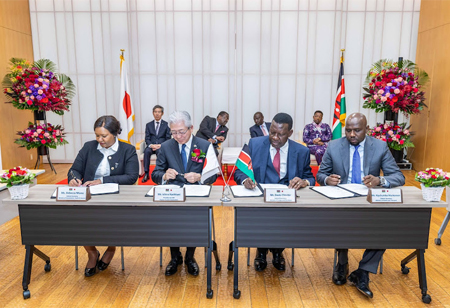
Kenya and Toyota Partner for Local Vehicle Production, Renewable Energy

 In an effort to reduce used-car imports and enhance local production, Kenya and Japan's Toyota have entered into a significant vehicle manufacturing agreement. The deal, witnessed by President William Ruto during his official visit to Japan, aims to strengthen Kenya's industrial sector and foster ties with Japan. Toyota Tsusho Corporation is set to invest an initial sum of Sh800 million in the Kenya Vehicle Manufacturers Limited plant located in Thika. The collaboration seeks to make locally manufactured vehicles more affordable, discouraging the reliance on imported used cars.
In an effort to reduce used-car imports and enhance local production, Kenya and Japan's Toyota have entered into a significant vehicle manufacturing agreement. The deal, witnessed by President William Ruto during his official visit to Japan, aims to strengthen Kenya's industrial sector and foster ties with Japan. Toyota Tsusho Corporation is set to invest an initial sum of Sh800 million in the Kenya Vehicle Manufacturers Limited plant located in Thika. The collaboration seeks to make locally manufactured vehicles more affordable, discouraging the reliance on imported used cars.
President Ruto emphasized the importance of achieving a balance between the number of imported and locally manufactured vehicles, addressing the dominance of second-hand cars in Kenya. Currently, Japan is the primary source of used cars, accounting for over 80% of vehicles on Kenyan roads. In addition to the motor vehicle agreement, the two nations signed a separate deal focusing on renewable energy development.
The agreement includes investments in projects such as the Sh15 billion Meru Wind Farm Energy, Sh8 billion Isiolo Solar Energy, and Sh75 billion Menengai Geothermal Plant. The collaboration also aims to promote electrified vehicles, including hydrogen electric and hybrid vehicles. Toyota Tsusho Corporation had previously initiated Semi Knocked Down (SKD) production of Toyota Motor Corporation's former Fortuner SUV in Kenya. SKD assembly involves importing the welded and painted body, with components assembled locally.
Despite efforts to boost local manufacturing, new car sales in Kenya faced challenges in the 11 months leading up to November. Factors such as a weak currency, higher taxes, and reduced disposable income contributed to a slowdown in sales. The Kenya Motor Industry Association reported a total of 10,595 units sold by major dealers, lagging behind the previous year's figures.
Isuzu maintained its lead in new vehicle sales, commanding a 46.9% market share with 4,973 units sold, followed by Toyota with 2,820 units (26.6% market share). The truck segment demonstrated sustained activity, indicating ongoing developments in the construction, manufacturing, and transport sectors. The government's push for increased local production, coupled with international collaborations, aims to transform Kenya's automotive industry and reduce dependency on imported used cars.

